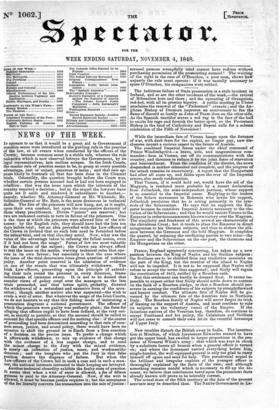While the immediate fate of Vienna hangs upon the fortunes
of war, with dark fears for the capital, no longer gay, new dis- closures impart a curious aspect to the future of Austria.
The combined Imperial forces under the chief command of Prince Windischgriitz-a brave, able, and magnanimous com- mander—hem in Vienna, cut off its communications with the country, and threaten to reduce it by the joint force of starvation and bombardment. From the condition of the district, the news despatched is neither connected nor complete, and the progress of the attack remains in uncertainty. A report that the Hungarians had after all come up, and fallen upon the rear of the Imperial armies, also needs confirmation. That Vienna, if it could hold out, would have the aid of the Magyars, is rendered more probable by a recent declaration from Jellachich, the semi-independent partisan, whose support is so essential to the Imperial cause. Replying to the leaders of the Selave movement in Bohemia who invite his support, Jellachich proclaims that he is acting primarily in the inte- rests of the Sclavonians. He says that he supports the Em- peror because he considers Imperial Austria necessary to the ele- vation of the Sclavonians ; and that he would restore Vienna to the Emperor in order teconsumm ate his own victory over the Magyars. The simplicity and frankness of this avowal are characteristic of the chivalrous Croat ; but it tends to place the Emperor in direct antagonism to his German subjects, and thus to restore the alli- ance between the Germans and the bold Magyars. It simplifies the quarrel, by reducing the conflicting parties to two sides—the Emperor and the Sclavonians on the one part, the Germans and the Hungarians on the other.
























